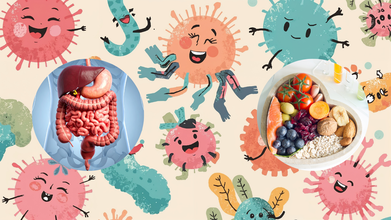- Health Conditions A-Z
- Health & Wellness
- Nutrition
- Fitness
- Health News
- Ayurveda
- Videos
- Medicine A-Z
- Parenting
- Web Stories
Intermittent Fasting and Brain Health: Is There a Risk of Cognitive Decline?

Credits: Canva
Intermittent fasting is an eating plan that alternates between periods of eating and fasting on a set schedule. Studies show that intermittent fasting can help manage weight and even reduce the risk of certain diseases. But some people worry whether fasting could harm the brain or lead to cognitive decline.
Researchers addressed this concern in a paper published in Psychological Bulletin, reporting that short-term fasting of less than 24 hours does not appear to affect the mental performance of adults.
What Is Intermittent Fasting?
Intermittent fasting is an eating pattern that involves alternating between times when you don’t eat and times when you do, sometimes with calorie restrictions on specific days.
This practice dates back thousands of years and is woven into several cultural and religious traditions. Scientists began studying it for weight control in the early 1900s, and recent research has expanded to explore its broader health effects.
There are three widely followed types of intermittent fasting, as per Healthline:
- Time-restricted eating: You eat within a fixed time window and fast during the remaining hours. The 16/8 pattern is the most popular, where you eat during an 8-hour window and fast for 16 hours (including sleep). Other variations include 14/10 and 20/4.
- Alternate-day fasting: You rotate between normal eating days and fasting days, when you consume very few calories, around 500 on average. Some prefer spreading this limited intake across the day, while others eat one small meal.
- 5:2 fasting: Instead of alternating daily, this plan limits calorie intake to 500–800 calories on two chosen days each week, while the rest of the week follows a regular eating routine.
Intermittent Fasting and Brain Health: How Are They Related?
Only recently have scientists started exploring how intermittent fasting influences the brain. Early findings suggest it might offer certain cognitive benefits as we age and even help reduce symptoms of anxiety or depression.
“Many people assume fasting will make it hard to focus or perform well at work or school,” said David Moreau, PhD, a neuroscientist at the University of Auckland and senior author of the study. “Our findings show that for most healthy adults, short-term fasting doesn’t significantly impact mental sharpness.”
The research did note that children and teenagers experienced slight declines in attention and memory while fasting, emphasizing the need for a balanced breakfast before school. Adults, meanwhile, tended to perform a little worse later in the day while fasting, possibly because hunger can heighten natural dips in alertness due to circadian rhythm.
“Humans evolved with periods of limited food, so it makes sense our brains can function well without constant eating,” Dr. Moreau added. “Still, younger people seem more affected, which aligns with their higher energy demands.”
Intermittent Fasting Unlikely to Cause Cognitive Decline
According to recent studies, as per Healthline, intermittent fasting is unlikely to cause cognitive decline. Experts who reviewed the findings say it reinforces the safety and benefits of fasting. “The key takeaway is that fasting doesn’t harm mental performance,” said Dr. Mir Ali, bariatric surgeon and medical director at the MemorialCare Surgical Weight Loss Center, California.
The meta-analysis reviewed 63 studies across the world, including over 3,400 participants. Most individuals fasted between 8 and 24 hours, with a median duration of 12 hours.
Researchers concluded that fasting “neither enhances nor impairs mental performance.” They identified three main factors that influence cognitive function:
- Fasting duration
- Type and timing of the cognitive test
- Individual characteristics, such as age or body composition
They also noted that glycogen—the body’s stored form of glucose provides energy during normal eating. When glycogen levels fall during fasting, the body shifts to using ketones derived from fat as an alternate energy source.
How To Practise Intermittent Fasting?
Intermittent fasting is not suitable for everyone, particularly those with a history of eating disorders or women who are pregnant or breastfeeding. However, for most healthy adults, it offers flexibility in timing and approach.
During fasting hours, you can still drink water, black coffee, or unsweetened tea. Light exercise is also permitted. Healthline advises focusing on nutrient-rich meals during eating periods, staying hydrated, and maintaining good sleep habits.
For beginners, it’s best to start slowly, perhaps by fasting for 6 to 8 hours at first, then gradually extending to 8–10 hours, and eventually to the more balanced 12–14-hour fasting window.
Coffee For Heart: A Yes Or No? Here's What The Study Says

Credits: Canva
Coffee is almost everyone's favorite, whether it is to get you up and moving in the mornings, especially when the winter comes in, or to ensure your productivity is at best, or for when you hit the gym. And, if you are wondering to drink it or not with heart disease, the good news is, you can! A new study published in JAMA Network says so.
Traditionally, coffee has been associated with being a troublemaker, however, this thing could soon be put in past, as scientists are now asking people to drink coffee, because it might actually be good for their heart.
In a first-of-its-kind clinical trial, researchers found that a daily cup of caffeinated coffee could actually protect the heart.
What Was The Study?
The study is led by researchers from UC San Francisco and the University of Adelaide. The study noted that drinking coffee every day may reduce the risk of Atrial fibrillation or A-Fib. Published in JAMA Network, the study said that coffee worked best against the condition, which is an irregular and often rapid heart rhythm that causes symptoms like palpitations, fatigue, and breathlessness. All of these could significantly increase the risk of stroke and heart failure.
It is caused by chaotic electrical signals in the upper chambers of the heart – known as atria, which leads to ineffective blood pumping and can cause blood clots to form.
Till now, those with A-Fib were advised not to drink caffeine out of fear that it may trigger symptoms. However, this trial – named DECAF - concluded that drinking a cup of caffeinated coffee a day reduced the deadly condition by 39%.
What Are The Experts Saying?
As per the researchers, and other scientists, coffee increases physical activity and reduces atrial fibrillation. Since caffeine is a diuretic, it potentially reduces blood pressure and, in turn, lowers the risk of A-Fib.
“There are many other ingredients in coffee that also have anti-inflammatory properties with positive effects,” said senior author Dr Gregory M. Marcus, who holds the Endowed Professorship in Atrial Fibrillation Research and is an electrophysiologist at UCSF Health.
How Was The Study Conducted?
Researchers wanted to understand how coffee affects people with A-Fib, so they enrolled 200 coffee drinkers who had persistent atrial fibrillation or atrial flutter. All of them were already scheduled for electrical cardioversion, a procedure that uses a controlled electric shock to reset the heart’s rhythm.
Participants were randomly split into two groups. One group had to drink at least one cup of caffeinated coffee or an espresso shot every day. The other group had to avoid all coffee and caffeine for six months. By the end of the study, the coffee group had a 39 percent lower risk of A-Fib coming back. They also showed signs of reduced inflammation.
The researchers suggested that coffee might help simply because it replaces less healthy drinks. “The results were astounding. Doctors have long told patients with A-Fib to cut back on coffee, but this trial suggests coffee is not only safe but may actually protect the heart,” said lead author Dr Christopher X. Wong of UCSF and the University of Adelaide and Royal Adelaide Hospital.
No, Gym, No Extreme Transformation Needed: Your Gut Health In 2026 Depends On What You Eat In 2025, Says Gut Doctor

Credits: Canva
Dr Pal Manickam, a gastroenterologist based in US says that many gut issues begin with something as simple as dehydration. Instead of reaching for tea or coffee immediately after waking up, he suggests drinking a full glass of water. This simple act helps kickstart digestion, supports bowel movements, and hydrates the system after a long night of fasting.
He explains that the gut thrives when the body has enough fluid to move waste smoothly through the intestines. Over time, this habit can reduce bloating, constipation, and sluggish digestion.
Eat Your First Meal When You’re Actually Hungry
One of Dr Pal’s most practical habits is this: don’t eat by the clock; eat by hunger cues. Many people force breakfast early in the morning even when they don’t feel hungry, which can strain the digestive system.
By waiting until natural hunger appears, the gut produces the right hormones and enzymes needed for efficient digestion. This also prevents overeating and mindless snacking, helping improve metabolic health without rigid dieting.
Add More Fiber To Your Plate
Fiber is the gut’s favorite food. Dr Pal recommends gradually increasing plant-based foods like fruits, vegetables, lentils, nuts, and seeds. These feed good gut bacteria and improve stool consistency.
He highlights that even a small increase, like adding a fruit with breakfast or a handful of nuts in the evening, can significantly improve digestion. Over weeks and months, this leads to better bowel regularity, reduced acidity, and a stronger gut microbiome.
Avoid Lying Down Immediately After Meals
One of his simplest yet most effective rules is avoiding the bed or couch right after eating. Lying down slows digestion and increases the chances of acid reflux or bloating.
Instead, Dr Pal suggests staying upright or taking a gentle walk for 10 to 15 minutes. This small habit improves meal breakdown and reduces nighttime discomfort.
Chew Slowly And Mindfully
Most people underestimate the connection between chewing and gut health. Dr Pal emphasizes that digestion starts in the mouth. The more thoroughly food is chewed, the easier it becomes for the stomach and intestines to process it.
Mindful chewing also reduces overeating, promotes satiety, and supports gut function by easing the overall digestive workload.
Don’t Chase Quick Fixes or Extreme Diets
While trends like detox teas, severe fasting, carb-cutting, or raw-food diets may seem attractive, Dr Pal warns against them. They often shock the gut, cause nutrient imbalance, and are unsustainable long-term.
He believes consistency always beats intensity. Small habits, done daily, reshape the gut far more effectively than restrictive fads.
Prioritize Sleep As A Daily Gut Reset
Gut health isn’t only about food. Dr Pal reminds people that poor sleep disrupts digestive hormones, increases cravings, and slows metabolism. Even one night of bad sleep can trigger acidity or bloating.
Aiming for seven to eight hours of restful sleep allows the digestive system to reset and repair itself naturally.
This Simple Green Tea Addition May Help Protect Against Alzheimer’s, Researchers Say

Credits: Canva
Alzheimer’s disease (AD) is a progressive brain disorder that slowly impairs memory, reasoning, and behavior, eventually disrupting daily life. It affects nearly six million Americans and is believed to result from the buildup of two abnormal proteins, beta-amyloid, which forms sticky plaques, and tau, which creates twisted tangles inside brain cells.
While there is no cure yet, research suggests that diet may help lower the risk or delay the onset of Alzheimer’s. The NIA notes that eating patterns like the Mediterranean or MIND diets, along with certain foods and supplements, might support brain health by reducing inflammation, improving circulation, and protecting cells from oxidative stress.
If you are wondering what foods may help, green tea is worth considering. Rich in antioxidants—especially epigallocatechin gallate (EGCG)—this centuries-old drink has long been linked to better brain health. According to Medical News Today, EGCG may help protect neurons from damage, and when combined with vitamin B3, also known as nicotinamide, it could provide an even stronger defense against Alzheimer’s.
How Green Tea Might Protect Against Alzheimer’s
Green tea is more than a relaxing beverage as it may play a role in protecting the brain from Alzheimer’s disease. A 2022 review in Nutrients found that EGCG helps prevent beta-amyloid plaques from forming, which are one of the major hallmarks of the disease.
Another study published in the International Journal of Molecular Sciences in 2022 showed that EGCG might even break down existing beta-amyloid proteins, possibly slowing how quickly Alzheimer’s progresses.
The benefits don’t stop there. Green tea’s antioxidants help neutralize free radicals, reducing oxidative stress that can harm brain cells. They may also lower inflammation levels, another key factor linked to Alzheimer’s risk. Additionally, green tea supports better blood flow to the brain through anti-atherosclerotic and anti-thrombotic actions—meaning it helps prevent cholesterol buildup and blood clots, both of which can interfere with oxygen delivery to the brain.
Pairing Green Tea And Vitamin B3
Recent findings suggest that combining green tea with vitamin B3 could take its protective potential further. A 2025 study in GeroScience found that pairing EGCG with nicotinamide improved brain cell energy levels, helping them function more like those in younger brains. Researchers from the University of California, Irvine, explained that this combination might help restore the brain’s ability to clear beta-amyloid plaques, strengthening its natural defense mechanisms.
Adding this duo to your daily life is easy. Vitamin B3 is present in many common foods, like chicken, turkey, salmon, peanuts, avocado, and rice, or it can be taken as a supplement. Aim for three to five cups of green tea each day with meals that include these foods, as recommended by The Times of India. If you prefer supplements, choose nicotinamide and check with your doctor before starting to ensure it’s safe with your medications or health conditions.
While the combination of green tea and vitamin B3 shows promise, it is not a cure for Alzheimer’s. Scientists emphasize that more research is needed to confirm its effectiveness. Still, incorporating both into a balanced lifestyle may offer a simple, accessible way to support long-term brain health and possibly keep the mind sharper with age.
© 2024 Bennett, Coleman & Company Limited

